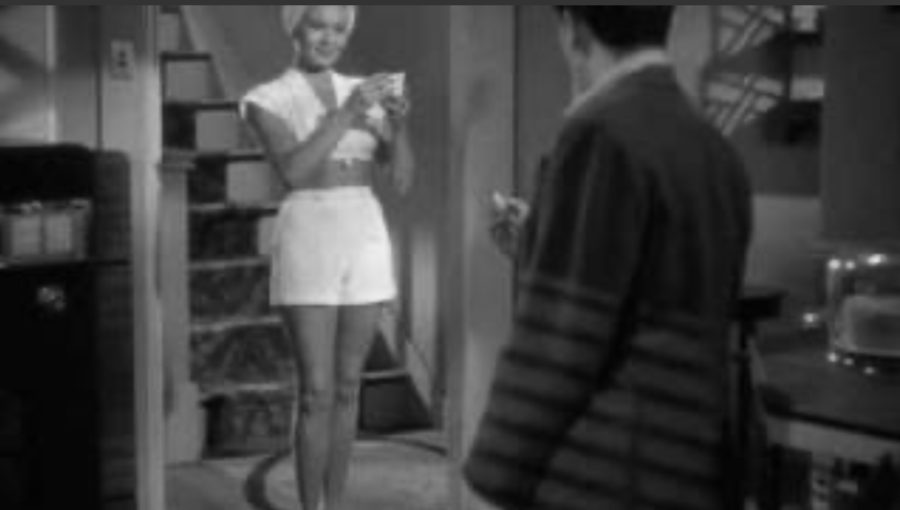The term “male gaze” refers to the ideology of masculinity and heterosexuality that makes up the world’s cultural and artistic production in film, television and the written word, and gives women an identity that serves and is used by men. This term is a concept that is often brought up for discussion in today’s feminist world.
The Postman Always Rings Twice (1946)
This is a famous example of the male gaze. In the next scene, the spectators become introduced to Cora Smith, the main character of the film. Through a closed up shot, the camera compels the viewer to gaze at Cora’s body. This builds a sense of sexual desire, voyeurism and submission to the point of view of the character.
The ‘male gaze’ is closely linked to political content, which gives men a specialising power that includes objectifying and sexualising the way women are viewed. For a normal heterosexual male, well-built women are often positioned as ‘objects’ of their desire. Any feelings or thoughts they have become unimportant, or to put it another way, machismo is inflicted on women.
Modern society is slowly erasing the aggression that people have to maintain in a feral society, and is also slowly becoming less harmful to women.
Of course, the aggressive stares presented in such earlier films and TV programmes must be a bad thing, as they can lead to a strong sense of male ego, machismo, male individual heroism, and thus to a lot of criminal behaviour. Like in India.
Often times there are questions about whether there is such a thing as the ‘female gaze’. I think there must be, both in reality and in works of art, where there are many highly accomplished and good-looking individuals. But unlike the ‘male gaze’, the ‘female gaze’ does not cause any substantial harm to men, i.e. it does not lower their social status in any way. The patriarchal ideology that has been cemented in people’s consciousness from time immemorial has solidified the image of women in their lives, and so it is difficult to have an impact that is directly reflected on men in society. It is impossible for women to look at men in the same way.
For most of us, anything like this can’t be ignored, and it’s important for the state and the media, and it’s an important part of the education system in this use style of country, and learning to respect will always be a heavily weighted part of it.
What women, on the other hand, need to understand is that although too many Hollywood films exist with a higher proportion of men and even demeaning behaviour towards the image of women, a good woman succumbs to this and they should stop sighing over the bad situation at the moment and remember to take advantage of the freedoms and opportunities for education that society now gives to all people, seize the opportunity to improve themselves and remember that ‘what matters is not what you look like, but what others think of you’.
reference:
Usdin, C. (2008) The postman always rings twice.1946, YouTube. Available at: https://youtu.be/WGFer3-Aguw?si=nAC782IG_hvaIZud (Usdin, 2008).
Alan, F. (2005) ProQuest | Better Research, Better Learning, better insights., ProQuest. Available at: https://www.proquest.com/ (Alan, 2005).
The print (2019) Know why Delhi is called the Rape Capital, YouTube. Available at: https://youtu.be/APIAPD67Jds?si=tD_-1dNIjZasiKBX (2019).


The “male gaze” concept describes how women are represented in movies and television in a way that pleases men. This makes women appear to be objects to be viewed rather than real people with their own thoughts and emotions. It is vital to Keep changing that and show women in movies and TV as whole people, not just how they look. The good thing is that there are more strong female characters in media, and things are slowly getting better, but let’s keep things going. There is still much work to be done to become truly equitable.
This passage reflects the pervasive influence of the “male gaze” in society, highlighting its potential harm to women and evolving societal attitudes. It calls for awareness-raising, media responsibility, and education to promote respect. The advice to women stresses the importance of self-improvement and seizing opportunities, emphasising substance over appearance.